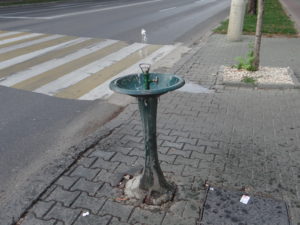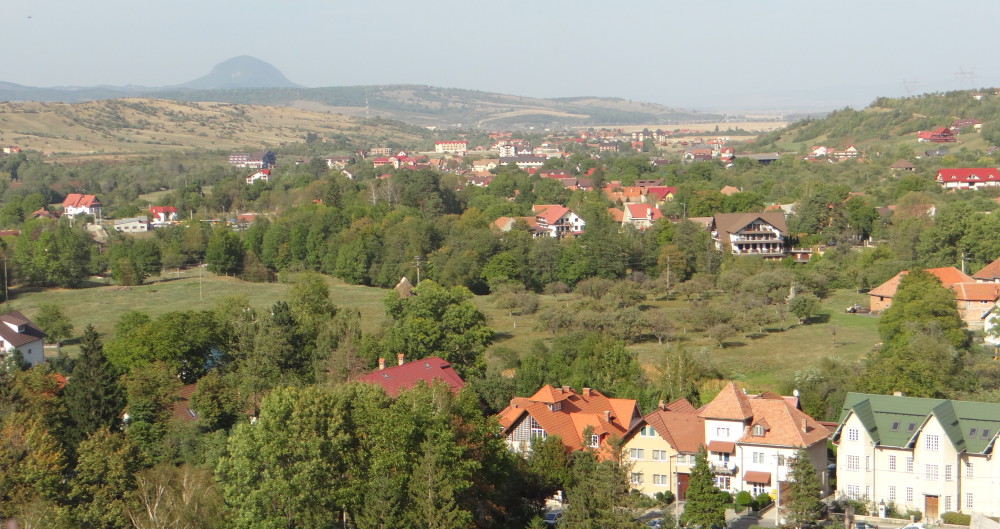 Ploiesti water fountain I drank from as a child (taken in 2012)
Ploiesti water fountain I drank from as a child (taken in 2012)
When I left Romania after twenty years of frugal subsistence and tyranny under Ceausescu’s communist regime, I thought the nightmare was over, I was moving to America, the land of freedom and opportunity, and everything would be all right. All I had to do is study and educate myself as fast as I could.
There were so many opportunities to succeed! I worked very hard and I eventually transformed these opportunities into success. Nothing was given to me on a silver platter and I certainly did not have white privilege, on the contrary, I was told time and time again when I looked for a job that I was not a protected minority. I watched classmates with lower grades and ability, who learned to milk the rigged system, get jobs they did not deserve simply because they had a different skin color.
Something did not feel quite right in the academic environment I chose. I felt that I had escaped one nightmare 7,000 miles away, leaving behind forever my beloved family, and jumped into another bad dream, one run by American academics and administrators.
If I were to survive, I had to learn new skills to cope in the more covert communistic environment rigged in favor of tenured liberals who protected, rewarded, promoted, and tenured nobody else but more liberals.
I am not sure I could endure it today, considering the appalling communism in the American academia, on every American campus, where free thought and divergent opinions are not allowed; the faculty and administrators are no longer hiding their communist agenda. Campuses have become breeding grounds for future anarchists of America who are carefully shaped and selected for their robotic ignorance of anything of value and vitriolic aggression.
I had spent my last contract weeks in 2008 in the vaunted hallways of academia shredding every Economics lesson I had ever taught to my college students and to my gifted 11th and 12th graders in a southern school, in preparation for my retirement.
By shredding all my papers and lesson plans, I somehow wanted to erase the twenty years of frustration and pain I had experienced with some of my socialist colleagues and one administrator after another who were eager to serve the collectivist cause of social justice rather than merit, uniqueness, and excellence. In retrospect, I wish today that I had kept the lessons. I also left behind all the foreign language dictionaries and many lesson plans I had developed. I am sure they were thrown out as soon as I had vacated my office and turned in the key.
I was not surprised that none of my colleagues moved a finger to celebrate my retirement. But an active parent, who appreciated my teaching, organized a collective celebration for me, two other retiring colleagues, and an administrator.
At the time, I was the longest serving teacher since the founding of the school. I walked out the door, without fanfare, appreciation, thank you, good-byes, or even an “I love myself” certificate or plaques that were so generously given to my colleagues over the years. In the grand scheme of things it does not matter anyway.
I did not realize how bad it was until the liberal newspaper whose owners also controlled the mass-media in the small town, refused to run a paid ad about my retirement. It is impossible not to know in a small town who all the prominent teachers are, especially someone like me, who did not promote their societally-regressive agenda which they euphemistically named progressivism. At the same time, they ran free one-page news stories on the retirement of the administrator after four years of “service” and of my colleagues. I was persona-non-grata no matter how I sliced reality.
The sad reality was that a few highly progressive families in town owned pretty much anything of value, including the minds of current and future Americans.
Most of my former students, with few notable exceptions, became devoted liberals, lawyers, feminists, doctors, advocates for social justice, heavily involved in global citizenship efforts, international non-profits, and teachers who proudly impart Common Core “values” to their students, the new generations of “progressives.”
I was one of the best paid teachers in the state at the time, not because I was the darling of the socialists surrounding me, but because I deserved it and few if any could replace me. I could teach four entirely different subjects with ease and knowledge, Economics and three foreign languages. Nobody else could match that skill or take it away from me.
I walked out the door with a sense of personal accomplishment in the face of so much adversity but also of regret for my twenty years of service that I wasted on progressive ingrates. By the time they reached my classroom, most of the students had already been thoroughly indoctrinated into socialism/communism as a perfect societal ideology.
The moment I walked out the door, a sense of freedom overwhelmed me – I had successfully survived the second communist phase of my life. The first one was escaping from communist Romania in 1978.
The small southern town was a safe place at the time to raise a family even for a single parent like me. Colleagues had asked me repeatedly how I could be anything else but a Democrat, when I was a teacher, a woman, a single mom, and a foreigner.
We were not legal immigrants in the late seventies; we were foreigners/aliens with a green card. I did not mind the term “alien” as long as I was not going back to the communist Iron Curtain and the oppressing life. I still don’t find the term offensive today. We were alien to these lands and to its customs.
It was not an auspicious time to be a foreigner/alien then. Nobody fawned over us, we had to have legal papers to be in the country, and we had to be healthy. In other words, we were properly vetted because legal immigration was strictly enforced and was not meant to benefit the immigrants but the American people.
There were not exactly many Romanians in the south, we were pretty much oddities coming from a faraway country that nobody had any idea where it was geographically located, nor did they care. That feeling extended to my American children who eventually felt frustrated and perhaps understood the feeling of isolation, of being different.
When they were smaller, they would beg my mom and me not to speak Romanian in public because people stared at us. My children were quite embarrassed to speak a foreign language fluently but they appreciated that skill as adults. Many families would not allow their children to play with mine and we were followed in stores as if we were going to rob it at gunpoint.
They did not know how many times, while I was pushing a stroller with mom, we were asked to leave mom and pop stores as our business was not welcome there. I swallowed my pride and went about my business. Mom, even though she did not speak English, intuitively understood the insults. But we did not allow that offensive and ignorant behavior to define who we were. These people were not xenophobic; they were ignorant and fearful.
But one store welcomed our business with open arms, and the owner’s son became our friend to this day. Of Jewish faith, perhaps he understood more than he let on the difficulty of being different in a small southern town.
Times have changed and now illegal immigrants and economic refugees from non-Christian lands rule the country; southerners and Americans in general bend over backwards to please them, rolling the red carpet and spreading their hard-earned wealth to economic refugees through generous welfare programs. I wished they had extended just a smidgen of kindness to us; we would have felt so much better.
I was lucky to find Lois and Harold, with their two lovely daughters. Through a twist of fate, they became our adopted family. We had spent many holidays with them and visited them through the years. I am not sure I could have adjusted so well to southern life without their help and advice.
There were other legal immigrants like us and they were treated the same. We formed our own club and helped each other the best we could with advice, food, clothes, rental money for expensive apartments in a college town, adjustment to a foreign life, and translation services for citizenship papers.
We cooked ethnic foods and had monthly pot luck suppers in the homes of those who were lucky enough to have afforded to purchase a home. Most of us were poor students hailing from communist and other totalitarian regimes, often struggling to raise and feed a family in a small apartment or a tiny rented house.
To my knowledge, those friends I made became contributing members to our society and, I am almost certain, they never promoted utopian communism.
ILEANA JOHNSON
American By Choice

I wish I could share some of your posts on Facebook
I still wish I could share some of your posts on Facebook
very touching story and reminded me of my grandfather who didn’t speak english and was thrown out of 2nd grade. he learned to speak write and read english and truly loved this country. worked during depression and fed all his brothers and sisters every sunday. i’m glad i got my education years ago i don’t think i would have survived today. thank you for such insightful writing.
You are welcome. I am glad your grandfather was able to learn English eventually. God’s blessings to you during this Christmas season, 2017.
Dr. Johnson,
ANYBODY can “Do the right thing” when there is no cost.
Heroes do “Do the right thing” DESPITE the cost.
Please have a Merry Christmas, and keep publishing.